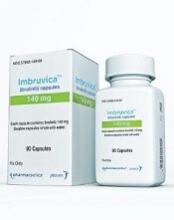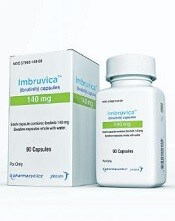User login
The 140 mg capsules of Imbruvica® (ibrutinib) will remain on the market, according to Pharmacyclics LLC.
Pharmacyclics (an AbbVie company) and Janssen had planned to discontinue the capsules after introducing a single-tablet formulation of Imbruvica earlier this year.
However, the companies received negative feedback about the discontinuation and decided to keep the 140 mg capsules on the market.
In February, the US Food and Drug Administration (FDA) approved a single-tablet formulation of Imbruvica that is available in 4 doses—140 mg, 280 mg, 420 mg, and 560 mg.
Pharmacyclics and Janssen introduced this formulation to enable a once-a-day dosing regimen. The companies said the goal with the new formulation was to improve adherence because some patients had to take 3 or 4 pills every day to get the recommended dose of Imbruvica.
After introducing the new formulation, Pharmacyclics and Janssen planned to discontinue the 140 mg capsules.
Critics spoke out against this change in an article published in The Cancer Letter. They noted that discontinuing the old formulation would mean price increases for some patients. That’s because the single-tablet formulation of Imbruvica has the same price regardless of dose—$400 per tablet.
Patients on lower doses of Imbruvica would experience an increase in cost if they switched from the capsules to the tablet formulation. In fact, costs could triple for patients on the 140 mg dose.
Pharmacyclics argued that most patients on Imbruvica—those taking the 420 mg and 560 mg doses—would see no increase in out-of-pocket costs when transitioning to the single-tablet formulation. And patients on the 560 mg dose would likely see a decrease in their out-of-pocket costs.
However, critics pointed to results of a recent pilot study, which indicated that the recommended dose of Imbruvica for patients with chronic lymphocytic leukemia (CLL)—420 mg—may be too high. The results suggested that CLL patients could receive lower doses of Imbruvica without a reduction in efficacy.
Therefore, keeping the 140 mg capsules on the market could mean lower costs for some CLL patients.
In addition to voicing concerns about costs, the critics pointed out that discontinuing the 140 mg capsules of Imbruvica would make it more difficult to adjust patients’ doses when needed.
Pharmacyclics said its YOU&i™ Dose Exchange Program can aid healthcare professionals in adjusting doses before patients have finished their current pack of Imbruvica. Patients would receive a “rapid shipment” of their new dose at no additional cost.
But the critics said this program “creates a barrier to optimal prescribing for some patients” and urged the FDA to review the safety of the program.
Roughly a month after the critics made this recommendation in The Cancer Letter article, Pharmacyclics announced that the 140 mg capsules of Imbruvica would remain on the market.
The 140 mg capsules of Imbruvica® (ibrutinib) will remain on the market, according to Pharmacyclics LLC.
Pharmacyclics (an AbbVie company) and Janssen had planned to discontinue the capsules after introducing a single-tablet formulation of Imbruvica earlier this year.
However, the companies received negative feedback about the discontinuation and decided to keep the 140 mg capsules on the market.
In February, the US Food and Drug Administration (FDA) approved a single-tablet formulation of Imbruvica that is available in 4 doses—140 mg, 280 mg, 420 mg, and 560 mg.
Pharmacyclics and Janssen introduced this formulation to enable a once-a-day dosing regimen. The companies said the goal with the new formulation was to improve adherence because some patients had to take 3 or 4 pills every day to get the recommended dose of Imbruvica.
After introducing the new formulation, Pharmacyclics and Janssen planned to discontinue the 140 mg capsules.
Critics spoke out against this change in an article published in The Cancer Letter. They noted that discontinuing the old formulation would mean price increases for some patients. That’s because the single-tablet formulation of Imbruvica has the same price regardless of dose—$400 per tablet.
Patients on lower doses of Imbruvica would experience an increase in cost if they switched from the capsules to the tablet formulation. In fact, costs could triple for patients on the 140 mg dose.
Pharmacyclics argued that most patients on Imbruvica—those taking the 420 mg and 560 mg doses—would see no increase in out-of-pocket costs when transitioning to the single-tablet formulation. And patients on the 560 mg dose would likely see a decrease in their out-of-pocket costs.
However, critics pointed to results of a recent pilot study, which indicated that the recommended dose of Imbruvica for patients with chronic lymphocytic leukemia (CLL)—420 mg—may be too high. The results suggested that CLL patients could receive lower doses of Imbruvica without a reduction in efficacy.
Therefore, keeping the 140 mg capsules on the market could mean lower costs for some CLL patients.
In addition to voicing concerns about costs, the critics pointed out that discontinuing the 140 mg capsules of Imbruvica would make it more difficult to adjust patients’ doses when needed.
Pharmacyclics said its YOU&i™ Dose Exchange Program can aid healthcare professionals in adjusting doses before patients have finished their current pack of Imbruvica. Patients would receive a “rapid shipment” of their new dose at no additional cost.
But the critics said this program “creates a barrier to optimal prescribing for some patients” and urged the FDA to review the safety of the program.
Roughly a month after the critics made this recommendation in The Cancer Letter article, Pharmacyclics announced that the 140 mg capsules of Imbruvica would remain on the market.
The 140 mg capsules of Imbruvica® (ibrutinib) will remain on the market, according to Pharmacyclics LLC.
Pharmacyclics (an AbbVie company) and Janssen had planned to discontinue the capsules after introducing a single-tablet formulation of Imbruvica earlier this year.
However, the companies received negative feedback about the discontinuation and decided to keep the 140 mg capsules on the market.
In February, the US Food and Drug Administration (FDA) approved a single-tablet formulation of Imbruvica that is available in 4 doses—140 mg, 280 mg, 420 mg, and 560 mg.
Pharmacyclics and Janssen introduced this formulation to enable a once-a-day dosing regimen. The companies said the goal with the new formulation was to improve adherence because some patients had to take 3 or 4 pills every day to get the recommended dose of Imbruvica.
After introducing the new formulation, Pharmacyclics and Janssen planned to discontinue the 140 mg capsules.
Critics spoke out against this change in an article published in The Cancer Letter. They noted that discontinuing the old formulation would mean price increases for some patients. That’s because the single-tablet formulation of Imbruvica has the same price regardless of dose—$400 per tablet.
Patients on lower doses of Imbruvica would experience an increase in cost if they switched from the capsules to the tablet formulation. In fact, costs could triple for patients on the 140 mg dose.
Pharmacyclics argued that most patients on Imbruvica—those taking the 420 mg and 560 mg doses—would see no increase in out-of-pocket costs when transitioning to the single-tablet formulation. And patients on the 560 mg dose would likely see a decrease in their out-of-pocket costs.
However, critics pointed to results of a recent pilot study, which indicated that the recommended dose of Imbruvica for patients with chronic lymphocytic leukemia (CLL)—420 mg—may be too high. The results suggested that CLL patients could receive lower doses of Imbruvica without a reduction in efficacy.
Therefore, keeping the 140 mg capsules on the market could mean lower costs for some CLL patients.
In addition to voicing concerns about costs, the critics pointed out that discontinuing the 140 mg capsules of Imbruvica would make it more difficult to adjust patients’ doses when needed.
Pharmacyclics said its YOU&i™ Dose Exchange Program can aid healthcare professionals in adjusting doses before patients have finished their current pack of Imbruvica. Patients would receive a “rapid shipment” of their new dose at no additional cost.
But the critics said this program “creates a barrier to optimal prescribing for some patients” and urged the FDA to review the safety of the program.
Roughly a month after the critics made this recommendation in The Cancer Letter article, Pharmacyclics announced that the 140 mg capsules of Imbruvica would remain on the market.

